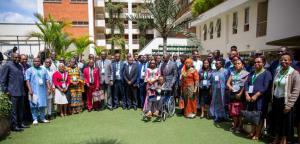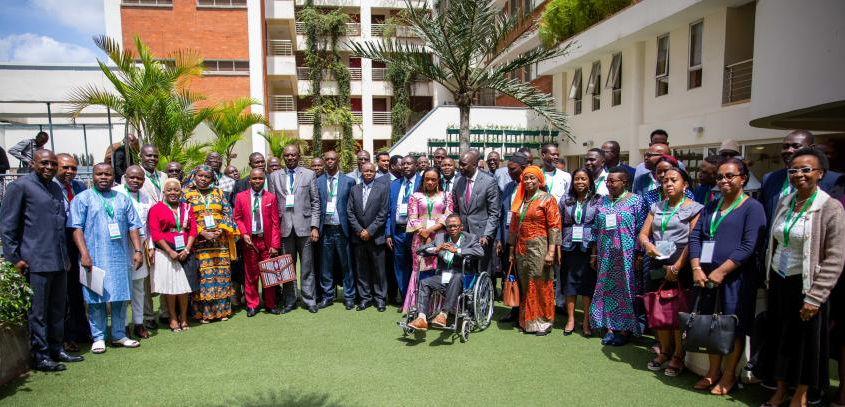As ECOSOCC welcomes 4th Permanent General Assembly
The Economic, Social and Cultural Council of the African Union (AU-ECOSOCC), an advisory organ established to give African Civil Society Organizations (CSOs) a voice within AU’s decision-making processes, recently constituted and inaugurated its 4th Permanent General Assembly (PGA) for a four-year tenure.

The 4th Permanent General Assembly (PGA) of the African Union Economic, Social and Cultural Council (AU-ECOSOCC) was constituted and inaugurated December 6 – 9, 2022 in Nairobi, Kenya. ECOSOCC was established under Articles 5 and 22 of the AU Constitutive Act, as an advisory organ made up of diverse Non-governmental Organizations (NGOs), social, cultural and professional groups from AU member states and the African Diaspora.
The statutes establishing ECOSOCC were adopted by the Assembly of Heads of State and Government of the AU during its third ordinary session in July 2004, while the ECOSOCC Interim General Assembly was launched in March 2005, with late Kenyan environmental activist and Nobel Laureate Wangari Maathai elected as its interim president. Since then, ECOSOCC has continued to bridge the gap between the AU, Africa’s civil society and African citizenry.
In addition to the General Assembly, which is the Council’s highest decision and policy making body, the ECOSOCC Statues provide for an organizational structure comprising of a Standing Committee; 10 Sectoral Cluster Committees; as well as a Credentials Committee. Moreover, the PGA’s structure comprises 2 CSOs from each of the 55 AU Member States; 10 and 8 CSOs active at regional and continental levels, respectively; as well as 20 civic organizations representing the African Diaspora.
The Standing Committee coordinates ECOSOCC’s work and prepares the GA’s meetings, while the sectoral committees serve as its operational mechanism, formulating opinions and providing inputs into the policies and programs of the AU. The 18-member Standing Committee comprises the Presiding Officer, 5 Deputy Presiding Officers, 2 representatives of the AU and chairpersons of the 10 sectoral committees which comprise peace and security, political affairs, trade and industry, amidst others.
Among its numerous functions as an advisory organ, ECOSOCC contributes to the effective translation of the objectives, principles and policies of the AU into concrete programmes; the promotion of popular participation and the realization of the vision and objectives of the Union, through the promotion of human rights, the rule of law, good governance, democratic principles, gender equality and child rights; as well as forging Pan-African values to enhance an African social model.
Rancor-free election, a trajectory worth emulation – Head of ECOSOCC Secretariat
Mr William Carew, Head of the ECOSOCC Secretariat, while giving the closing remarks, congratulated the newly elected members of the 4th PGA for their manifestation of political maturity during elections to the bureau and the various sectoral committees of the Council. He said unlike previous elections which were characterized by chaos, the 4PGA members displayed a high-level sense of decorum and camaraderie, in the true spirit of African unity and in practice of the AU’s famed principles of rotation and consensus.
With the outcome of the elections, Carew said, ECOSOCC had sent a strong message to all and sundry. “The way the PGA members consulted and traded-off various positions for others is worth emulating. We were expecting this process to be chaotic and full of drama, which is what past elections were known for, but the 4th PGA, which I am very proud of, has proven otherwise. I have confidence and great optimism that the 4th PGA will be the ECOSOCC that Member States envision it to be,” Mr Carew said.
The ECOSOCC chief also admonished the new GA members to change the Council’s narrative and drive it to the next level of its operationalization, which he said, has been the institutional priority of the ECOSOCC Secretariat since its establishment to preserve ECOSOCC’s reputation and build stakeholder confidence in its ability to effectively carry out its mandate.
ECOSOCC should leverage African Diaspora resources – Dr Sing’oei
Dr Alfred Mutua, Cabinet Secretary (Minister) in the Kenyan Ministry of Foreign and Diaspora Affairs, while giving the keynote address through his ministry’s Principal Secretary, Dr Abraham Sing’oei, congratulated the newly constituted 4PGA, and lauded the Council’s outgoing 3PGA led by the Kenyan Denise Kodhe, for a hitch free transition. He applauded ECOSOCC’s role in bringing the AU closer to the African people as well as promoting an integrated, prosperous and peaceful Africa driven by its own citizens.
“We are confronted with a myriad of challenges, from climate change that has ravaged our continent and the globe, to democratic recession and the return of authoritarianism and coup d’états that threaten the wellbeing of our societies. Moreover, the conflicts that we seek to silence have continued to take the lives of our women and children and steal our future,” the Kenyan official said.
Dr Sing’oei said the challenges faced by the African continent were by far too enormous to be resolved by Member States alone, hence the need for governments to work with the civil society and private sector, leveraging their capacities and competencies to address the continent’s challenges. He, therefore, called upon ECOSOCC to translate AU policies to the people, underscoring the need to also leverage the enormous human and material resources to be offered by the African Diaspora.
We’d keep creating platforms and spaces to engage African CSOs – Amb Katungye
In his remarks, Moussa Faki Mahamat, Chairperson of the AU Commission, who spoke through Amb Rossette Katungye, Technical Advisor on Regional Integration of the Bureau of the African Union, said the Union would keep providing platforms and spaces to engage African CSOs in support of their fundamental role towards achieving the goals and aspirations of Agenda 2063.
“I, therefore, implore you all to be committed and support the work of the ECOSOCC and the AU at large. On our part, we will continue to create spaces and provide platforms for the African civil societies to continue expressing themselves as they continue to implement our Agenda 2063. Civil societies and state actors are very important entities in the collaboration with member states as the AU sees civil society as key and strategic partners in Africa’s development,” Amb Katungye explained.
Additionally, Amb Katungye said the creation of ECOSOCC was a testament of the AU’s commitment to its citizens’ centered vision and applauded the outgoing 3rd ECOSOCC PGA for the successes it recorded in the previous 4 years, despite the challenges occasioned by the outbreak of the Covid-19 pandemic.
“Evidently, the vision puts a herculean task on African civil society and while recognizing that this is not an easy task, we are also confident in the capacity of the civil society in Africa to deliver on it. By going with the new mantra of African solutions to African problems, we are of the view that partnerships between governments, AU and civil society will help achieve the desired vision of Agenda 2063,” the AU diplomat assured.
A look at ECOSOCC’s milestones
In his valedictory remarks, outgoing Presiding Officer of ECOSOCC, Mr Denise Kodhe, said the 3PGA had between 2018 and 2022 recorded numerous successes, namely providing visibility to ECOSOCC and fostering partnerships between the Council and partners such as the European Union, the German Agency for International Cooperation (GIZ), the International Partnership on Religion and Sustainable Development (PaRD), and the Economic Commission for Africa (ECA), among others.
Moreover, Mr Kodhe said the outgoing 3PGA had, in partnership with the ECOSOCC Secretariat, fostered a harmonious working relationship with sister organs of the AU, namely the Pan African Parliament (PAP); the African Court on Human and Peoples’ Rights (AfCHPR); and the African Peer Review Mechanism (APRM). In addition, he said ECOSOCC has built successful partnerships with the African Development Bank (AfDB), and the Common Market for Eastern and Southern Africa (COMESA).
It will be recalled that the ECOSOCC Secretariat relocated from the premises of the AU Commission in Addis Ababa, Ethiopia, to a dedicated secretariat in Lusaka, Zambia, in 2019. Among others, the now standalone Secretariat has since then made significant strides, namely producing a series of policy documents, including an array of policy opinions and two policy booklets, as well as developing a civil society toolkit to build the capacity of African CSOs to operate effectively as strategic partners of the AU.
Likewise, in the aftermath of the outbreak of the Covid-19 pandemic, ECOSOCC implemented a COVID-19 awareness campaign, hosting webinars and town-halls to sensitize African citizens on the Covid-19 pandemic and civil society on effective grassroots vaccination strategies, respectively. In 2022, ECOSOCC convened several sensitisation forums on the African Continental Free Trade Agreement (AfCFTA), the Free Movement Protocol (FMP) and the Unconstitutional Changes of Government (UCGs) in Africa.
Members of the newly constituted ECOSOCC Bureau include Khalid Boudali (Presiding Officer) from Morocco; Brenda Brewer-Moore (Deputy Presiding Officer – West Africa) from Liberia; and Chongsi Ayeah Joseph (Deputy Presiding Officer – Central Africa) from Cameroon. Others were Mahendranath Busgopaul (Deputy Presiding Officer – East Africa) from Mauritius and Robert Phiri (Deputy Presiding Officer – Southern Africa) from Malawi.
















